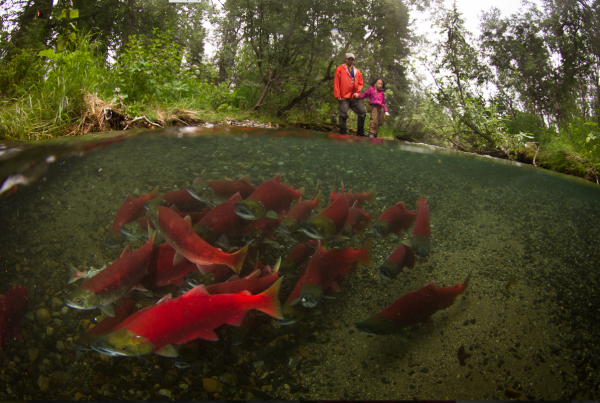New online portal to communicate salmon science
April 9, 2018
Lauren Frisch
907-474-5350

A new international Salmon Science Network recently launched an online portal to help improve access to salmon research and tackle emerging challenges in salmon conservation.
The network, led by researchers from the University of Alaska Fairbanks, University of Washington and Simon Fraser University, was established in 2016 to enhance communication and access to research that is relevant to the conservation and management of salmon across the North Pacific Ocean. This is being accomplished by connecting the broader community of salmon researchers working on all aspects of salmon conservation and management.
“The challenges facing salmon in the 21st century are complex. This demands creative solutions informed by the best available science generated through collaborations and shared ideas. It is time to make it easier to share those ideas and level the playing field for access to important salmon science for everyone,” said Peter Westley, a researcher at the UAF College of Fisheries and Ocean Sciences.
Today, the network launched Salmon-Net, which will serve as an online portal for sharing information ranging from published journal articles on salmon science to photos of salmon and their ecosystems. The portal will publish Science Spotlights that highlight new research findings on topics such as the lack of contamination seen in wild Pacific salmon following the Fukushima nuclear power plant disaster, and marine mammal proliferation and predation on chinook salmon. The ultimate goal of Salmon-Net is to make this information as accessible as possible to any user looking for information on salmon.
“Science is only as useful as it is accessible and understandable to the stakeholders who want to put it into practice. Our goal is to improve the impact of the science relevant to salmon conservation by increasing the ease with which it can be obtained,” said University of Washington researcher Daniel Schindler.
The Salmon Science Network, supported by the Gordon and Betty Moore Foundation, also brings people together through working groups and symposia to tackle emerging issues in salmon conservation. For example, during fall 2017, researchers involved in the network supported a working group on glacial retreat and the future of salmon and their habitats. Scientists with expertise in glaciology, hydrology, watersheds and salmon from around the world came together at Simon Fraser University to discuss the implications of glacial retreat for salmon. The Salmon Science Network will continue to support working groups and symposia such as this over the next several years.
“Many great people and organizations are researching Pacific salmon or working towards their conservation and the sustainable fisheries they support. We are hopeful that Salmon-Net will help link scientists with one another as well as the greater network of salmon conservationists, managers and stakeholders,” said Simon Fraser University researcher Jonathan Moore.


